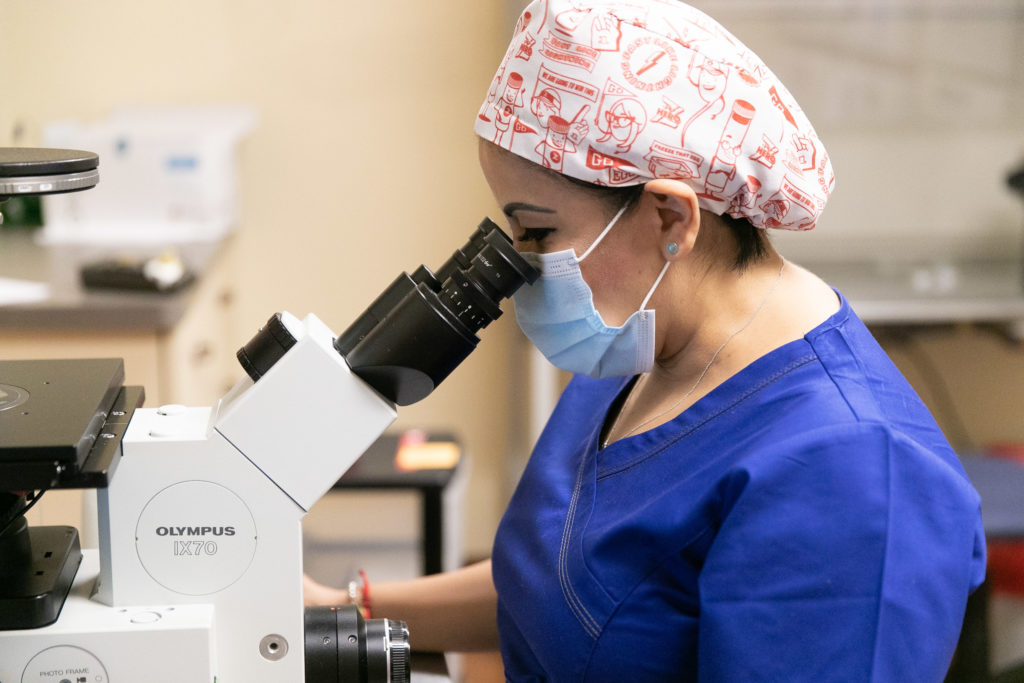Common Fertility Tests
 Some fertility testing options at our Tucson clinic can be done prior to seeing a Reproductive Endocrinologist and Fertility Specialist. Many diagnostic tests are covered by insurance, but you will want to check your benefits package to be certain (we can help you with this if you need). Most fertility test codes are coded for either fertility testing or irregular menstruation, depending on your specific diagnosis.
Some fertility testing options at our Tucson clinic can be done prior to seeing a Reproductive Endocrinologist and Fertility Specialist. Many diagnostic tests are covered by insurance, but you will want to check your benefits package to be certain (we can help you with this if you need). Most fertility test codes are coded for either fertility testing or irregular menstruation, depending on your specific diagnosis.
If you’ll be responsible for paying part or all of the cost of your treatment yourself, we’re completely transparent and up-front about the prices for these tests, and we’ll inform you ahead of time what you can expect to owe.
The common tests mentioned here are performed on the female partner, except where indicated.
- Day-three blood tests: These fertility testing methods are performed on the second-to-fifth day of the menstrual cycle, and include checking the levels of hormones such as FSH, LH, Estradiol, TSH, and Prolactin.
- Female physical exam: This method of fertility testing typically involves a general exam, comprehensive pelvic exam, including a transvaginal ultrasound of the ovaries and uterus, as well as cultures of the cervix. Pap smears and a breast exam may be performed if you have not had your annual with your gynecologist
- Testing for genetic mutation carrier status (for hereditary diseases like Cystic Fibrosis): This test may be indicated for one or both partners. Diagnostic tests may be indicated for diseases like HIV, Hepatitis, Gonorrhea and Syphilis.
- Hysterosalpingogram (HSG): This fertility testing method is an x-ray dye test of the uterus and fallopian tubes. It can diagnose tube blockage and uterine anomalies.
- Semen Analysis: In this type of fertility testing, a sample of the male’s semen is collected following 48 hours of abstinence. A laboratory that specializes in fertility testing procedures should conduct the analysis. A special sample collection kit is required. If this analysis indicates male factor infertility, we will ask that the male partner consult a urologist to make sure that the testes, penis and scrotum are normal. Cultures for infection may also be taken as well as blood testing to rule out infection or hormone problems as a cause for the fertility problem.
- Pelvic (transvaginal) ultrasound: This type of fertility testing is performed for a detailed look at the uterus and ovaries. This ultrasound will indicate the position of your ovaries in the pelvis, the position of the uterus, and will show any uterine fibroids or other abnormalities in the reproductive pelvis.
Other diagnostic fertility testing options may be indicated for specific diseases, depending on the medical and family histories of both the male and female partner.
Questions the physician will ask to identify the problem
When you visit our fertility clinic, we’ll begin with a thorough investigation of the reproductive systems of both partners, to help determine where the infertility problem lies.
Is there an ovulation problem?
Through fertility testing, we will attempt to discover if you are ovulating on a regular basis, and whether or not that ovulation is effective. Even if you have regular periods, it does not necessarily mean that you’re ovulating regularly. Blood tests can help determine the answer to this question, along with the pelvic ultrasound. About 33 percent of women who are infertile have difficulties with ovulation.
Is there a sperm problem?
The semen analysis is the first step in the fertility testing process, and can determine if the amount and quality of the sperm are normal. Additionally, blood testing for hormones may indicate issues with sperm production and effectiveness.
Are the egg and sperm able to unite?
Fertility testing through the HSG will help determine if there are blockages in the fallopian tubes or other anatomical problems that are preventing the sperm and egg from uniting.
Can the embryo implant in the uterus?
The HSG test can also detect things like polyps or fibroids in the uterus that may prevent implantation. Additionally, fertility testing through an endometrial biopsy may be indicated to make sure that the lining is developing properly, and the ultrasound will show the doctor the quality of the uterine lining around the time of ovulation.

